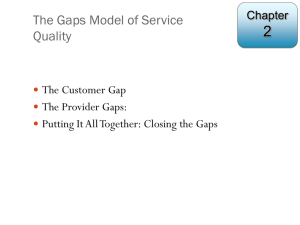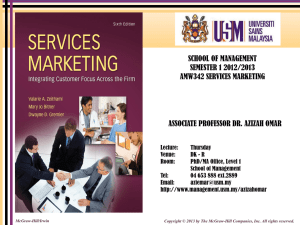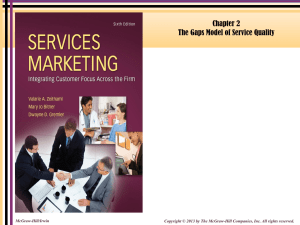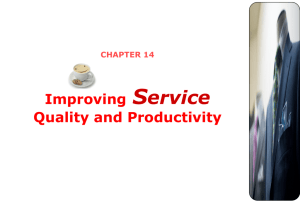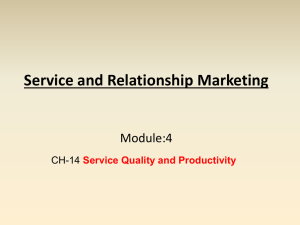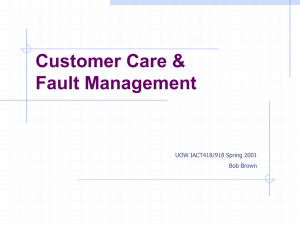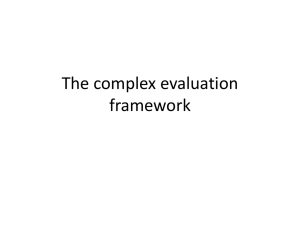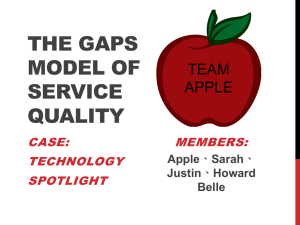Customer Gap
advertisement
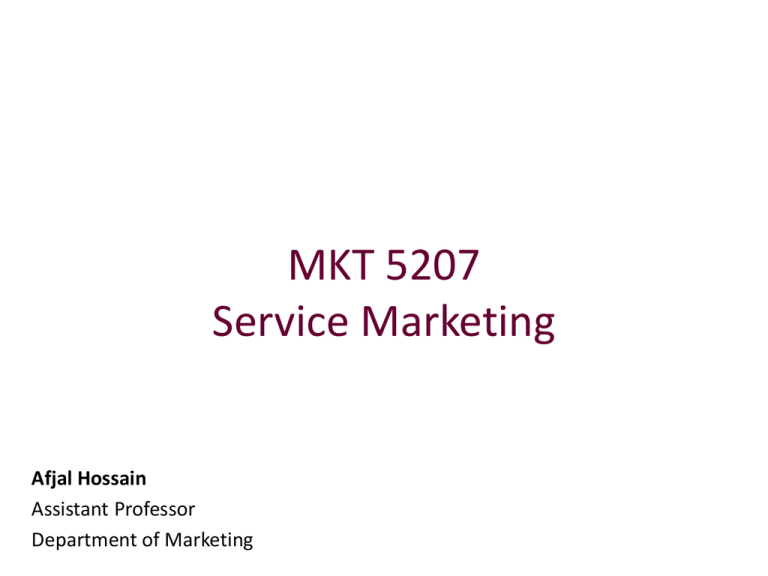
MKT 5207 Service Marketing Afjal Hossain Assistant Professor Department of Marketing Chapter 02 The Gaps Model of Service Quality The Gaps Model of Service Quality • The Customer Gap • The Provider Gaps: – Gap 1 – The Listening Gap • not knowing what customers expect – Gap 2 – The Design and Standards Gap • not having the right service designs and standards – Gap 3 – The Performance Gap • not delivering to service standards – Gap 4 – The Communication Gap • not matching performance to promises • Putting It All Together: Closing the Gaps The Customer Gap Customer Gap Figure 2.1 Key Factors Leading to the Customer Gap Customer Gap Customer Expectations Provider Gap 1: Not knowing what customers expect Provider Gap 2: Not selecting the right service designs and standards Provider Gap 3: Not delivering to service standards Provider Gap 4: Not matching performance to promises Customer Perceptions Gaps Model of Service Quality • Customer Gap: – difference between customer expectations and perceptions • Provider Gap 1 (Knowledge Gap): – not knowing what customers expect • Provider Gap 2 (Service Design & Standards Gap): – not having the right service designs and standards • Provider Gap 3 (Service Performance Gap): – not delivering to service standards • Provider Gap 4 (Communication Gap): – not matching performance to promises Provider Gap 1 Not knowing what customers expect CUSTOMER Expected Service Perceived Service COMPANY Gap 1: The Listening Gap Company Perceptions of Consumer Expectations Key Factors Leading to Provider Gap 1 Customer Expectations Gap 1 Inadequate marketing research orientation Insufficient marketing research Research not focused on service quality Inadequate use of market research Lack of upward communication Lack of interaction between management and customers Insufficient communication between contact employees and managers Too many layers between contact personnel and top management Insufficient relationship focus Lack of market segmentation Focus on transactions rather than relationships Focus on new customers rather than relationship customers Inadequate service recovery Lack of encouragement to listen to customer complaints Failure to make amends when things go wrong No appropriate recovery mechanisms in place for service failures Company Perceptions of Customer Expectations Figure 2.2 Provider Gap 2 Not having the right service quality designs and standards CUSTOMER COMPANY Customer-Driven Service Designs and Standards Gap 2: The Design and Standards Gap Company Perceptions of Consumer Expectations Key Factors Leading to Provider Gap 2 Customer-Driven Service Designs and Standards Gap 2 Poor service design Unsystematic new service development process Vague, undefined service designs Failure to connect service design to service positioning Absence of customer-driven standards Lack of customer-driven service standards Absence of process management to focus on customer requirements Absence of formal process for setting service quality goals Inappropriate physical evidence and servicescape Failure to develop tangibles in line with customer expectations Servicescape design that does not meet customer and employee needs Inadequate maintenance and updating of the servicescape Management Perceptions of Customer Expectations Figure 2.3 Provider Gap 3 Not delivering to service designs and standards CUSTOMER COMPANY Service Delivery Gap 3:The Performance Gap Customer-Driven Service Designs and Standards Key Factors Leading to Provider Gap 3 Customer-Driven Service Designs and Standards Gap 3 Deficiencies in human resource policies Ineffective recruitment Role ambiguity and role conflict Poor employee-technology job fit Inappropriate evaluation and compensation systems Lack of empowerment, perceived control, and teamwork Customers who do not fulfill roles Customers who lack knowledge of their roles and responsibilities Customers who negatively impact each other Problems with service intermediaries Channel conflict over objectives and performance Channel conflict over costs and rewards Difficulty controlling quality and consistency Tension between empowerment and control Failure to match supply and demand Failure to smooth peaks and valleys of demand Inappropriate customer mix Overreliance on price to smooth demand Service Delivery Figure 2.4 Provider Gap 4 Not matching performance to promises CUSTOMER Gap 4: The Communication Gap COMPANY Service Delivery External Communications to Customers Key Factors Leading to Provider Gap 4 Service Delivery Gap 4 Lack of integrated services marketing communications Tendency to view each external communication as independent Not including interactive marketing in communications plan Absence of strong internal marketing program Ineffective management of customer expectations Not managing customer expectations through all forms of communication Not adequately educating customers Overpromising Overpromising in advertising Overpromising in personal selling Overpromising through physical evidence cues Inadequate horizontal communications Insufficient communication between sales and operations Insufficient communication between advertising and operations Differences in policies and procedures across branches or units Inappropriate pricing High prices that raise customer expectations Prices that are not tied to customer perceptions of value External Communications to Customers Figure 2.5 Gaps Model of Service Quality CUSTOMER Expected Service Customer Gap Perceived Service Communication Gap COMPANY Listening Gap Service Delivery Performance Gap Customer-Driven Service Designs and Standards External Communications to Customers Design and Standards Gap Company Perceptions of Consumer Expectations Figure 2.6 Ways to Use Gap Analysis • Overall Strategic Assessment: – How are we doing overall in meeting or exceeding customer expectations? – How are we doing overall in closing the four company gaps? – Which gaps represent our strengths and where are our weaknesses? Ways to Use Gap Analysis • Specific Service Implementation – Who is the customer? What is the service? – Are we consistently meeting/exceeding customer expectations with this service? – If not, where are the gaps and what changes are needed? (Examine gaps 1-4 for this particular service.)
